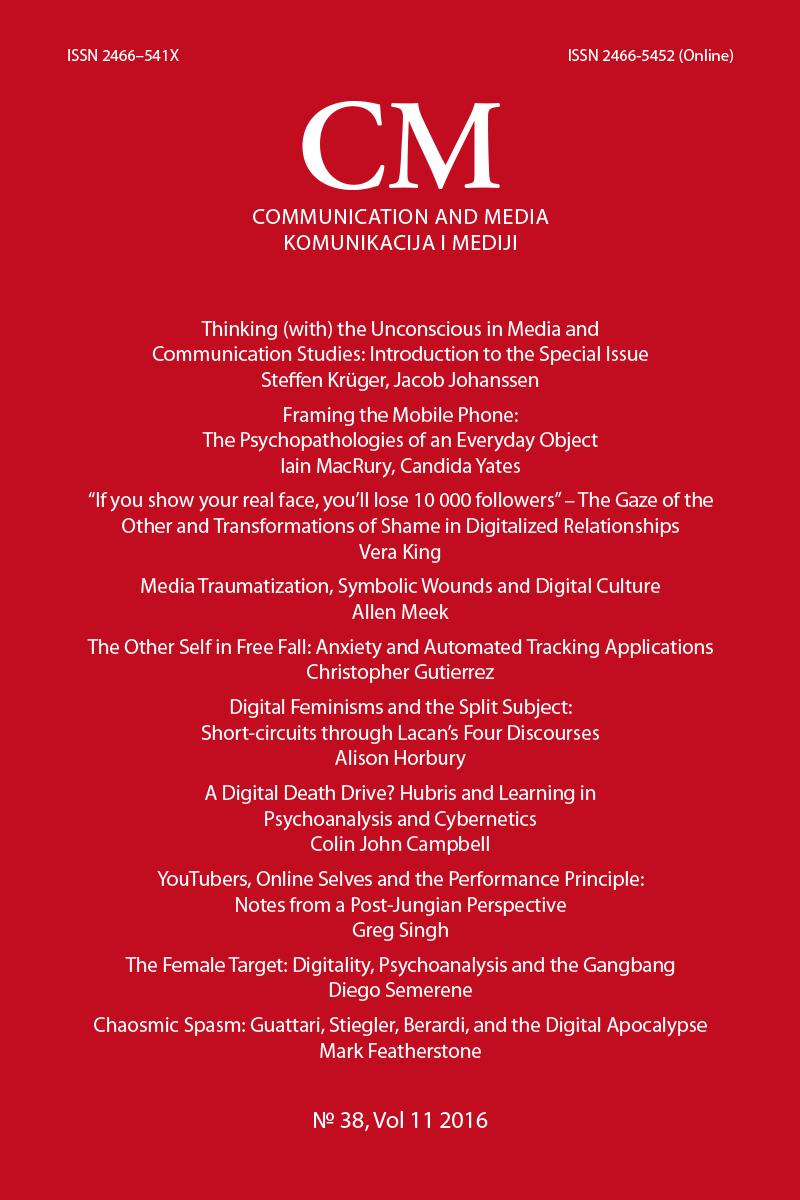A Digital Death Drive? Hubris and Learning in Psychoanalysis and Cybernetics
Abstract
This paper offers a critique of the fetishisation of ‘the digital’ in Western culture by bringing together Freudian and Marcusian psychoanalytic theory with Gregory Bateson’s cybernetics. In particular, it correlates the cybernetic concepts of analog and digital information with the psychoanalytic conceptual pair of Eros and Thanatos. The psychoanalytic concept of the ‘death drive’ appears through the cybernetic lens as a fetishistic tendency towards freezing or regressing to lower levels of complexity and sensitivity of learning. With the help of Marcuse and Bateson, I understand the contemporary prevalence of a ‘digital death drive’ as an inhibition of learning in terms of the nature of the digital and its severing from the analog context. By contrast, by reading Marcuse’s concept of Eros as having multiple logical levels (Eros1,2,3) in the cybernetic sense and by comparing these levels with Bateson’s multiple logical levels of learning (Learning1,2,3), we come to see Marcusean ‘erotic liberation’ or ‘revolutionary love’ not as resulting from simple acts or statements of rebellion against repressive socio-political norms, but rather as being profound, lifelong learning processes, fraught with complexity and difficulty.
References
Adorno, T. (2005). Minima Moralia. New York: Verso.
Aristotle (1963). Politics and Poetics (Jowett and Twining, trans.). New York: The Viking Press.
Bateson, G. (1971). Steps to an Ecology of Mind. New York: Ballantine Books.
Bateson, G. (1978). Beyond the Double-Bind: Communication and Family Systems, Theories and Techniques with Schizophrenics. New York: Brunner/Mazel.
Bateson, G. (1979). Mind and Nature: A Necessary Unity. New York: E.P. Dutton.
Bateson, M. C. (1991). Our Own Metaphor. Washington: Smithsonian Institution Press.
Bateson, M. C. (2014). Cybernetics in the Future: Introductory Lecture. Accessed 18. 11. 2016. URL: https://www.youtube.com/watch?v=nXQraugWbjQ.
Bell, S. & Horowitz, G. (eds.) (2016). The Book of Radical General Semantics. New Dehli: Pencraft International.
Freud, S. (1908/1989). Character and Anal Erotism. In Gay, P. (ed.), The Freud Reader (pp. 293–297). New York: W.W. Norton.
Freud, S. (1920/1989). Beyond the Pleasure Principle. In Gay, P. (ed.), The Freud Reader (pp. 594–626). New York: W.W. Norton.
Freud, S. (1925/1989). Three Essays on the Theory of Sexuality (6th edition). In Gay, P. (ed.), The Freud Reader (pp. 239–93). New York: W.W. Norton.
Freud, S. (1929/1989). Civilization and Its Discontents. In Gay, P. (ed.), The Freud Reader (pp. 722–771). New York: W.W. Norton.
Heidegger, M. (1993). The Question Concerning Technology. In Basic Writings. San Francisco: Harper.
Horowitz, G. (2016). Springing the Trap of Repression from the Inside: Lacan’s Marcuse. C-Theory, April, 2016. Accessed 18. 11. 2016. URL: http://ctheory.net/ctheory_wp/springing-the-trap-of-repression-from-the-inside-lacans-marcuse/.
Korzybski, A. (1948). Science and Sanity: An Introduction to Non-Aristotelian Systems and General Semantics. Lakeville: The International Non-Aristotelian Library Publishing Company.
Marcuse, H. (1955). Eros and Civilization. Boston: Beacon Press.
Marcuse, H. (1964). One-Dimensional Man. Boston: Beacon Press.
Marx, K. (1990). Capital. New York: Penguin.
Pickering, A. (2010). The Cybernetic Brain: Sketches of another Future. Chicago: University of Chicago Press.
Ramachandran, V. (2009). The Neurons that Shaped Civilization. Accessed 18. 11. 2016. URL: https://www.ted.com/talks/vs_ramachandran_the_neurons_that_shaped_civilization?language=e.
de Saussure, F. (2011). Course in General Linguistics (Baskin and Meisel trans.). New York: Columbia University Press.
Stern, D. (1990). Diary of a Baby. New York, NY: Basic Books.
Tiqqun (2001). “The Cybernetic Hypothesis.” Accessed 18. 11 2016. URL: https://theanarchistlibrary.org/library/tiqqun-the-cybernetic-hypothesis.
Copyright
Authors retain copyright of the published papers and grant to the publisher the non-exclusive right to publish the article, to be cited as its original publisher in case of reuse, and to distribute it in all forms and media.
Licensing
The published articles will be distributed under the Creative Commons Attribution ShareAlike 4.0 International license (CC BY-SA). It is allowed to copy and redistribute the material in any medium or format, and remix, transform, and build upon it for any purpose, even commercially, as long as appropriate credit is given to the original author(s), a link to the license is provided, it is indicated if changes were made and the new work is distributed under the same license as the original.
Users are required to provide full bibliographic description of the original publication (authors, article title, journal title, volume, issue, pages), as well as its DOI code. In electronic publishing, users are also required to link the content with both the original article published in CM: Communication and Media and the licence used.
Authors are able to enter into separate, additional contractual arrangements for the non-exclusive distribution of the journal's published version of the work (e.g., post it to an institutional repository or publish it in a book), with an acknowledgement of its initial publication in this journal.
Self-archiving policy
Authors are permitted to deposit author’s publisher's version (PDF) of their work in an institutional repository, subject-based repository, author's personal website (including social networking sites, such as ResearchGate, Academia.edu, etc.), at any time after publication.
Full bibliographic information (authors, article title, journal title, volume, issue, pages) about the original publication must be provided and links must be made to the article's DOI and the license.
Disclaimer
The views expressed in the published works do not express the views of the Editors and the Editorial Staff. The authors take legal and moral responsibility for the ideas expressed in the articles. Publisher shall have no liability in the event of issuance of any claims for damages. The Publisher will not be held legally responsible should there be any claims for compensation.

